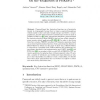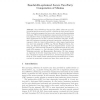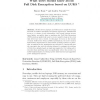256
click to vote
CANS
2015
Springer
9 years 9 months ago
2015
Springer
Existing work on data collection and analysis for aggregation is mainly focused on confidentiality issues. That is, the untrusted Aggregator learns only the aggregation result wit...
259
click to vote
CANS
2015
Springer
9 years 9 months ago
2015
Springer
Abstract Following the line of work presented recently by Bellare, Paterson and Rogaway, we formalize and investigate the resistance of linear secret-sharing schemes to mass survei...
283
click to vote
CANS
2015
Springer
9 years 9 months ago
2015
Springer
Secure Two-Party Computation (STC) allows two mutually untrusting parties to securely evaluate a function on their private inputs. While tremendous progress has been made towards r...
247
click to vote
CANS
2015
Springer
9 years 9 months ago
2015
Springer
Policies are the corner stones of today’s computer systems. They define secure states and safe operations. A common problem with policies is that their enforcement is often in c...
242
click to vote
CANS
2015
Springer
9 years 9 months ago
2015
Springer
Secure multiparty computation (SMC) offers a technique to preserve functionality and data privacy in mobile applications. Current protocols that make this costly cryptographic con...
253
click to vote
CANS
2015
Springer
9 years 9 months ago
2015
Springer
Besides the opportunities offered by the all-embracing Internet of Things (IoT) technology, it also poses a tremendous threat to the privacy of the carriers of these devices. In t...
234
click to vote
CANS
2015
Springer
9 years 9 months ago
2015
Springer
Mobile devices, laptops, and USB memory usually store large amounts of sensitive information frequently unprotected. Unauthorized access to or release of such information could rev...
236
click to vote
SACRYPT
2015
Springer
9 years 9 months ago
2015
Springer
There has been great progress regarding efficient implementations of fully homomorphic encryption schemes since the first construction by Gentry. However, evaluating complex circu...
230
click to vote
SACRYPT
2015
Springer
9 years 9 months ago
2015
Springer
Privacy-enhancing attribute-based credentials (PABCs) are the core ingredient to privacy-friendly authentication systems, allowing users to obtain credentials on attributes and pro...



